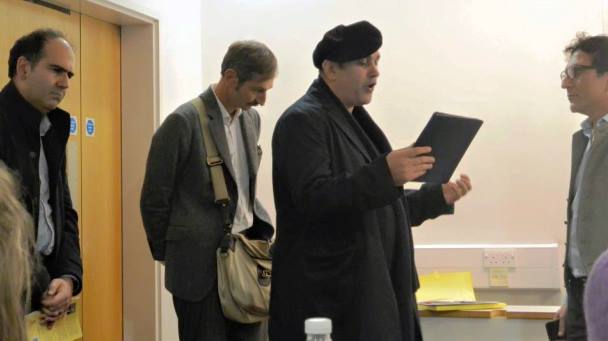
A few months back in December 2015, we at UCL PEN hosted an evening of poetry aimed at addressing the ongoing Mediterranean refugee crisis, titled ‘Something Happened in the Levant’. In partnership with the organisation Exiled Writers Ink! we had organised for a group of poets of refugee origin residing in London to showcase some of their work on cultural transition, movement and alienation.
Whilst it may seem natural for supporters of PEN to organize such an event, I myself occasionally felt uneasy about the idea. Faced with such a horrifying and urgent situation, didn’t the idea of a group of students putting on an evening of poetry as a response seem stupidly complacent?
It took the evening itself, with the work of Abol Froushan, Amarjit Chandan and Jennifer Langer, amongst many others to convince me of the importance of words in the face of crisis.
It has been said before that freedom of expression is a basis for all other rights, and this is clearly true with Europe’s refugee crisis. If the scenes witnessed throughout the Mediterranean from Lesbos to Lampedusa cannot be frankly described and relayed, then how can we demand a fair and humane response? Words clearly have an important role in recording and dealing with crisis in this sense.
But, away from this kind of reportage, I experienced a more reflective but equally important role for words, that of humanization. When confronted with images of the refugee crisis, whilst feelings of shock and concern are aroused, the visceral extremity of what we see also distances us from what we are witnessing, it seems that the images and people depicted in these images are so far removed from our experience that they are not fully ‘real’. With the words crafted by the poets at ‘Something Happened’ I found what is usually presented only from an exterior perspective was made radically interior, revealing a nuanced and honest humanity which brought the crisis urgently home.
Words, more than any other medium, allow us to share something of our interiority and through this sharing we can reach a common plane of understanding grounded in humanity. When faced with the appalling, actively seeking out humanity becomes all the more important. This is why I support PEN.
Oliver Ford is a second year History undergraduate at UCL, and the 2015/16 Chair of UCL Student PEN.